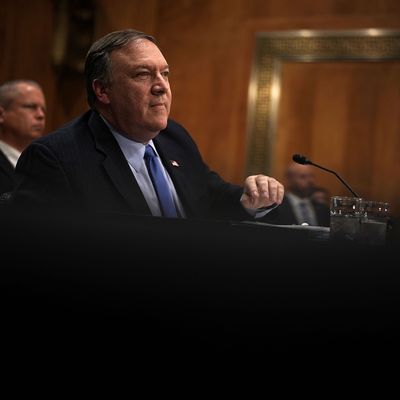
Secretary of State Mike Pompeo spent more than three hours before the Senate Foreign Relations Committee today, the first administration official to submit to sustained public questioning since the NATO and Helsinki summits and their aftermath. Pompeo, who was known for his dogged and hostile harangues of Obama administration officials, got more than a taste of his own medicine, the most concentrated dose coming when Senator Menendez (Democrat, New Jersey) said, “If President Obama did what President Trump did in Helsinki, I’d be peeling you off the ceiling!” Unsurprisingly, the hearing didn’t reveal what Putin and Trump talked about in their one-on-one, two-hour conversation, but it did shed some light on how some key players view each other, and the issues at stake:
Secretary Pompeo has a tightrope to walk. Watching him try to maintain a minimal level of collegiality with senators while also staying within the boundaries President Trump expects of his courtiers was exhausting. When Senator Flake attempted to compliment him on a policy, Pompeo insisted that it was “the president’s policy,” prompting Flake to allude to Trump’s contrary statements on the matter and conclude, “just take the compliment.” Later Pompeo told Corker, “Somehow there’s this opinion that the administration is free-floating. This is President Trump’s administration.”
The task of defending policy that contradicts Trump’s views while not offending Trump is a difficult enough task, but Pompeo seemed to have taken on a second one — not offending the North Koreans. While he was at pains to acknowledge that negotiations are not progressing, he also went out of his way to say that “I don’t think it’s fair to characterize them as walking back from commitments.” When senators from both parties asked questions about the state of North Korea’s nuclear program, Pompeo insisted he couldn’t discuss them in an unclassified setting — drawing surprised, if not incredulous responses.
Turns out, Russia isn’t a breaking point for the Senate GOP. Two GOP Senators joined Democrats in pressing Pompeo hard on the Helsinki summit, North Korea, and other topics. No points for guessing that neither of the two (Corker and Flake) are running for reelection. Corker accused Trump of “purposefully causing the American people to misunderstand the nature of NATO contributions” and went on to say that “that in my opinion was like what happened after Charlottesville.”
As for the others, Risch congratulated Pompeo on the “achievements” of the NATO summit; Rubio offered kudos on progress countering Russia; and Isakson asked Pompeo why Europeans couldn’t understand their own economic interests as well as the U.S. did.
Rand Paul has taken a hard turn into the pro-Russia camp. Paul spent much of his time on a vigorous defense of Trump’s meeting with Putin and then moved on to attack bipartisan legislation put forward by Rubio and Democrat Chris Van Hollen aimed at ensuring prompt investigation of and response to future foreign assaults on our elections. Given that Rubio had used his own time to solicit Pompeo’s support for the legislation, this was an unusual display of intraparty hostility. It does make you wonder about the content of the conversations Paul had on his post-summit trip to Moscow.
Pompeo, for his part, did say clearly that Russia was attempting to influence U.S. politics and that he would favor more sanctions on Moscow. It will be interesting to see whether those comments pass muster with Trump.
Speaking of Russia, Trump is still hung up on making a commitment to Ukraine’s sovereignty. Pompeo spoke the phrase “commitment to Ukraine and its territorial integrity,” and referred viewers to a newly released “Crimea Declaration,” which he said reaffirms U.S. policy. However, the “Crimea Declaration” turns out to be a State Department press release that doesn’t actually contain that phrase — instead containing some rather odd circumlocutions on the topic.
Surprise! Gun safety. Several Democratic Senators urged Pompeo to reconsider a State Department decision that will allow, if it goes ahead, plans for 3D-printable guns to be posted on the internet. Pompeo, despite his passion for administration policies on every other issue, passed on the opportunity to make a passionate defense of easily available guns, and even promised Massachusetts Democrat Ed Markey that he would review the issue.
Pompeo’s combativeness serves him poorly. During his confirmation, some opponents noted that he was known for a short temper and a manner that spilled over into rudeness. Today he was met with oceans of sympathy from his Republican colleagues — which he repaid with nearly as much high-handed pomposity as he lavished on his Democratic questioners. Senator Jeanne Shaheen, the panel’s only woman, finally snapped under a wave of mansplaining and delivered a passionate lecture on Syria. Later, Pompeo managed to get into two testy exchanges with Corker, insisting that he not receive credit for policies that he insisted belonged to Trump, and then insisting that he had already answered a question Corker said he didn’t expect an answer to. The sheer unpleasantness of watching these exchanges was a good reminder that one giant fragile ego per administration is far more than enough.





























